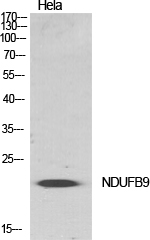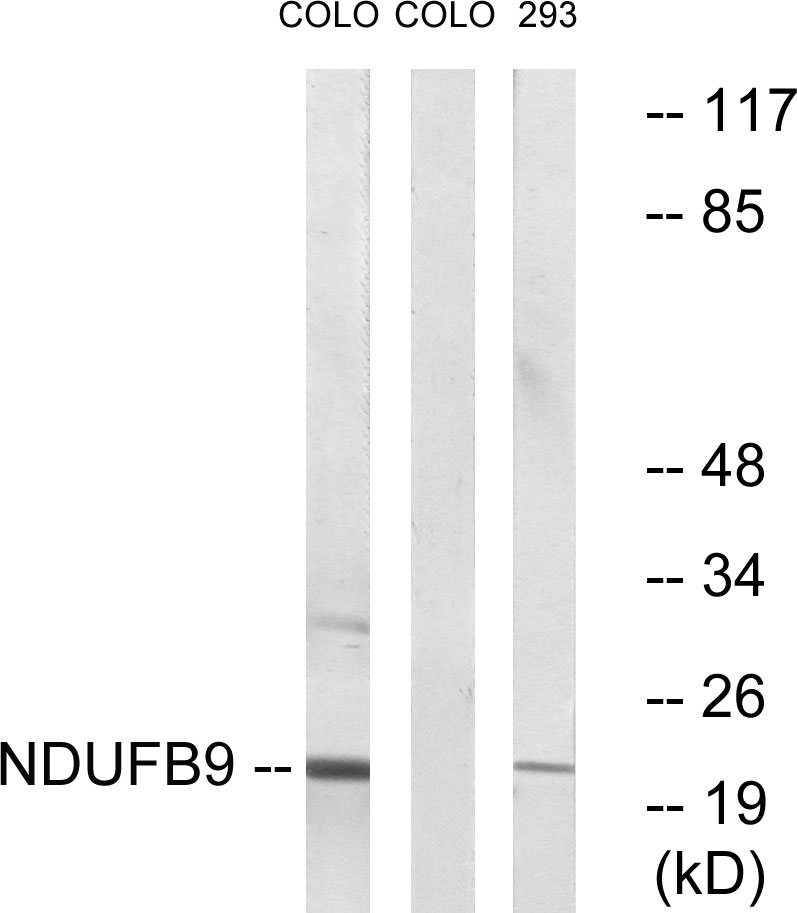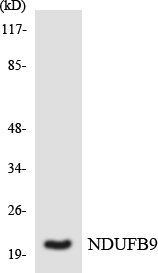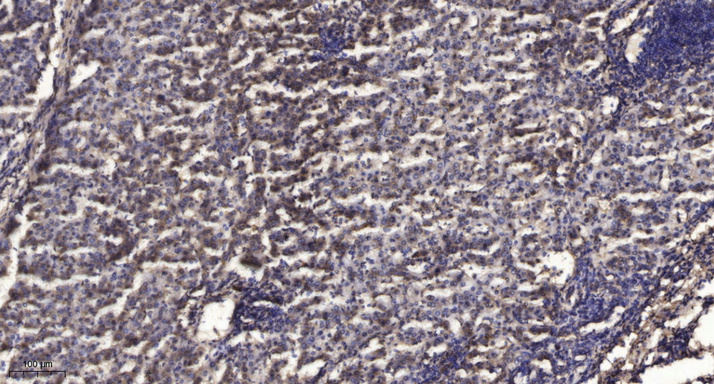NDUFB9 Polyclonal Antibody
- Catalog No.:YT3014
- Applications:WB;IHC;IF;ELISA
- Reactivity:Human;Mouse
- Target:
- NDUFB9
- Fields:
- >>Oxidative phosphorylation;>>Metabolic pathways;>>Thermogenesis;>>Retrograde endocannabinoid signaling;>>Non-alcoholic fatty liver disease;>>Alzheimer disease;>>Parkinson disease;>>Amyotrophic lateral sclerosis;>>Huntington disease;>>Prion disease;>>Pathways of neurodegeneration - multiple diseases;>>Chemical carcinogenesis - reactive oxygen species;>>Diabetic cardiomyopathy
- Gene Name:
- NDUFB9
- Protein Name:
- NADH dehydrogenase [ubiquinone] 1 beta subcomplex subunit 9
- Human Gene Id:
- 4715
- Human Swiss Prot No:
- Q9Y6M9
- Mouse Swiss Prot No:
- Q9CQJ8
- Immunogen:
- The antiserum was produced against synthesized peptide derived from human NDUFB9. AA range:102-151
- Specificity:
- NDUFB9 Polyclonal Antibody detects endogenous levels of NDUFB9 protein.
- Formulation:
- Liquid in PBS containing 50% glycerol, 0.5% BSA and 0.02% sodium azide.
- Source:
- Polyclonal, Rabbit,IgG
- Dilution:
- WB 1:500 - 1:2000. IHC 1:100 - 1:300. ELISA: 1:10000.. IF 1:50-200
- Purification:
- The antibody was affinity-purified from rabbit antiserum by affinity-chromatography using epitope-specific immunogen.
- Concentration:
- 1 mg/ml
- Storage Stability:
- -15°C to -25°C/1 year(Do not lower than -25°C)
- Other Name:
- NDUFB9;LYRM3;UQOR22;NADH dehydrogenase [ubiquinone] 1 beta subcomplex subunit 9;Complex I-B22;CI-B22;LYR motif-containing protein 3;NADH-ubiquinone oxidoreductase B22 subunit
- Observed Band(KD):
- 22kD
- Background:
- The protein encoded by this gene is a subunit of the mitochondrial oxidative phosphorylation complex I (nicotinamide adenine dinucleotide: ubiquinone oxidoreductase). Complex I is localized to the inner mitochondrial membrane and functions to dehydrogenate nicotinamide adenine dinucleotide and to shuttle electrons to coenzyme Q. Complex I deficiency is the most common defect found in oxidative phosphorylation disorders and results in a range of conditions, including lethal neonatal disease, hypertrophic cardiomyopathy, liver disease, and adult-onset neurodegenerative disorders. Pseudogenes of this gene are found on chromosomes five, seven and eight. Alternative splicing results in multiple transcript variants. [provided by RefSeq, Jul 2015],
- Function:
- function:Accessory subunit of the mitochondrial membrane respiratory chain NADH dehydrogenase (Complex I), that is believed to be not involved in catalysis. Complex I functions in the transfer of electrons from NADH to the respiratory chain. The immediate electron acceptor for the enzyme is believed to be ubiquinone.,similarity:Belongs to the complex I LYR family.,subunit:Mammalian complex I is composed of 45 different subunits.,
- Subcellular Location:
- Mitochondrion inner membrane ; Peripheral membrane protein ; Matrix side .
- Expression:
- Astrocytoma,Brain,Colon adenocarcinoma,Kidney,Placenta,Umbi
- June 19-2018
- WESTERN IMMUNOBLOTTING PROTOCOL
- June 19-2018
- IMMUNOHISTOCHEMISTRY-PARAFFIN PROTOCOL
- June 19-2018
- IMMUNOFLUORESCENCE PROTOCOL
- September 08-2020
- FLOW-CYTOMEYRT-PROTOCOL
- May 20-2022
- Cell-Based ELISA│解您多样本WB检测之困扰
- July 13-2018
- CELL-BASED-ELISA-PROTOCOL-FOR-ACETYL-PROTEIN
- July 13-2018
- CELL-BASED-ELISA-PROTOCOL-FOR-PHOSPHO-PROTEIN
- July 13-2018
- Antibody-FAQs
- Products Images

- Western Blot analysis of various cells using NDUFB9 Polyclonal Antibody diluted at 1:500
.jpg)
- Western Blot analysis of 293 cells using NDUFB9 Polyclonal Antibody diluted at 1:500

- Western blot analysis of lysates from COLO205 cells and 293 cells, using NDUFB9 Antibody. The lane on the right is blocked with the synthesized peptide.

- Western blot analysis of the lysates from COLO205 cells using NDUFB9 antibody.

- Immunohistochemical analysis of paraffin-embedded human liver cancer. 1, Antibody was diluted at 1:200(4° overnight). 2, Tris-EDTA,pH9.0 was used for antigen retrieval. 3,Secondary antibody was diluted at 1:200(room temperature, 45min).



